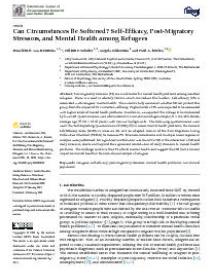Can Circumstances Be Softened? Self-Efficacy, Post-Migratory Stressors, and Mental Health among Refugees
Post-migratory stressors (PS) are a risk factor for mental health problems among resettled refugees. There is a need to identify factors which can reduce this burden. Self-efficacy (SE) is associated with refugees’ mental health. The current study examined whether SE can protect this group from the impact of PS on mental wellbeing. Higher levels of PS were expected to be associated with higher levels of mental health problems. In addition, we expected this linkage to be moderated by lower SE. Questionnaires were administered to a non-clinical refugee sample (N = 114, 46% female, average age 35 SD = 10.42 years) with various backgrounds.
The following questionnaires were used: the Self-Reporting Questionnaire-20 (SRQ-20) to assess mental health problems, the General Self-Efficacy Scale (SGES) to measure SE, and an adapted version of the Post-Migration Living Difficulties Checklist (PMLD) to measure PS. Bivariate correlations and multiple linear regression analysis were performed. No significant contribution was found for SE or the interaction of SE and daily stressors, above and beyond the significant contribution of daily stressors to mental health problems. The findings reinforce that PS affects mental health and suggest that SE had a limited impact on mental health in this non-clinical sample of refugees.
In: International Journal of Environmental Research and Public Health ; ISSN: 1660-4601 | 18 | 4 | februari | 1440
https://doi.org/10.3390/ijerph18041440
Open access


